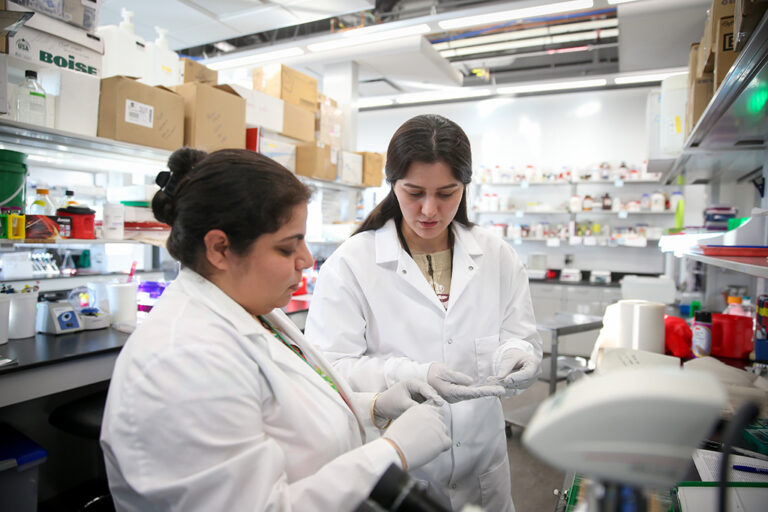Geiger named Interim PI of UND’s $10 million CoBRE grant exploring Indigenous health disparities
Jonathan Geiger, Ph.D., a Chester Fritz Distinguished Professor in the Department of Biomedical Sciences at the UND School of Medicine & Health Sciences (SMHS), has been named the Interim Principal Investigator (PI) on the School’s five-year, $10 million the National Institutes of Health (NIH) Center of Biomedical Research Excellence (CoBRE) research award targeting Indigenous health.
To date, UND has used the CoBRE grant, awarded to UND in 2021, to establish the world’s first Indigenous Trauma & Resilience Research Center (ITRRC). The ITRRC is designed to explore the impact of historical and unresolved trauma on health outcomes within the American Indian and Alaska Native population.
“It’s important for the community to know that this important work is continuing, and it’s continuing full speed ahead,” said Geiger, who is assuming a role formerly held by Don Warne, M.D., M.P.H. “If I can make even a small contribution to this important work on Indigenous trauma and resilience, and increasing the health of Indigenous people, I’d feel really good about that.”
In August, Warne was named Provost Fellow for Indigenous Health Policy at Johns Hopkins University’s Bloomberg School of Public Health. Despite moving to Johns Hopkins for the majority of his efforts, Warne, who helped develop the grant proposal, is dedicating approximately 20% of his time to the SMHS this year, not only to continue contributing to the ITRRC but to UND’s historic Indians Into Medicine (INMED) program, which turns 50 years old this year.
“Dr. Geiger has a long history of experience with CoBRE grants and the NIH, and this blending of skill-sets should only strengthen the work moving forward,” added Warne, who asked Geiger personally to take over for him as project lead. “We’re both excited to work collaboratively and roll out our next steps for the Center’s research as the pandemic wanes.”
The data suggest that the need for such scholarship is great. American Indians in North Dakota and the region suffer from significant health disparities, relative to the non-Native population, much of which is related to historical trauma, adverse childhood experiences, forced boarding school participation, social marginalization, and toxic stress. Earlier this year, the Centers for Disease Control & Prevention (CDC) reported a 6.5 year drop in life expectancy among American Indians from 2019 to 2022—a rate far higher than similar declines seen in the non-Native population.
A longtime faculty at SMHS, Geiger earned his doctorate in pharmacology and physiology from UND in 1982. After many years teaching and publishing at the University of Manitoba, Geiger returned to UND in 2003 to chair what is now the SMHS Department of Biomedical Sciences. Specializing in brain energy metabolism, the regulation of intracellular calcium, neuronal cell life and death in neurodegenerative diseases (e.g., Alzheimer’s and Parkinson’s disease), and the neurological complications of HIV-1 infection, Geiger has over 200 publications to his name and has been cited thousands of times.
Geiger and Warne noted that the NIH investment in Indigenous health at UND is already paying off. Earlier this year, for example, the SMHS partnered with the U.S. Department of Agriculture (UDSA) and the federally funded Human Nutrition & Research Center (HNRC) in Grand Forks on the School’s first clinical trial investigating the health impact of chokeberries, a fruit with a long history of use for healing in Indigenous communities.
“This specific project has already been a success story,” smiled Warne. “We were hoping for 50 participants in this study by the end of the calendar year, and we’ll definitely meet that goal. We’re now at the point of figuring out how to communicate, to people who still want to participate, that we’re full on this project.”
Likewise, Ursula Running Bear, an assistant professor at the SMHS working with the ITRRC, saw her work on the health outcomes of forced boarding school participation within the Indigenous community cited by a U.S. Department of the Interior report in May 2022 as part of its Federal Indian Boarding School Initiative.
“This is incredibly important work, and I’m honored to have been asked by Don to be PI and to help lead this work,” concluded Geiger, who said he has no plans to change the project’s community-driven Indigenous health focus and will include the Indigenous community in his team’s work up front. “Throughout my career, I’ve let data and events take me where they want to, and I’m never shy from accepting new challenges and learning new things.”
The grant in question is renewable twice, meaning that part of Geiger’s job will be helping convince the NIH to renew the grant in 2026. The NIH approved the grant’s leadership change in Oct. 2022.


